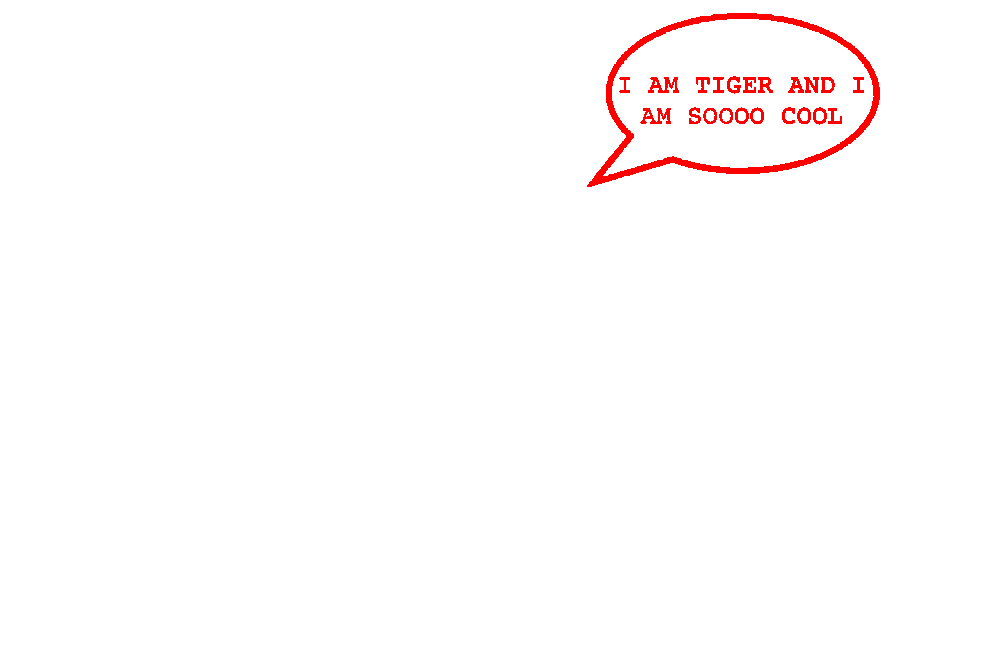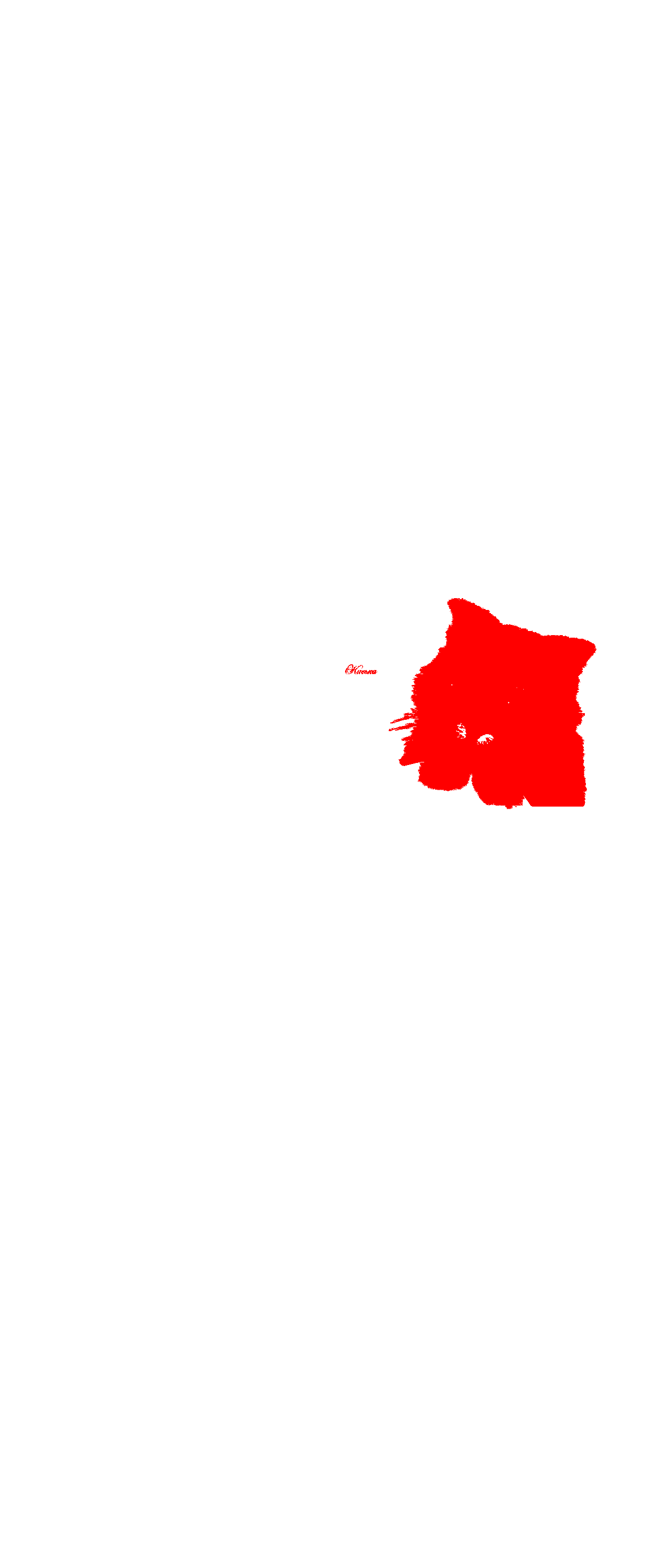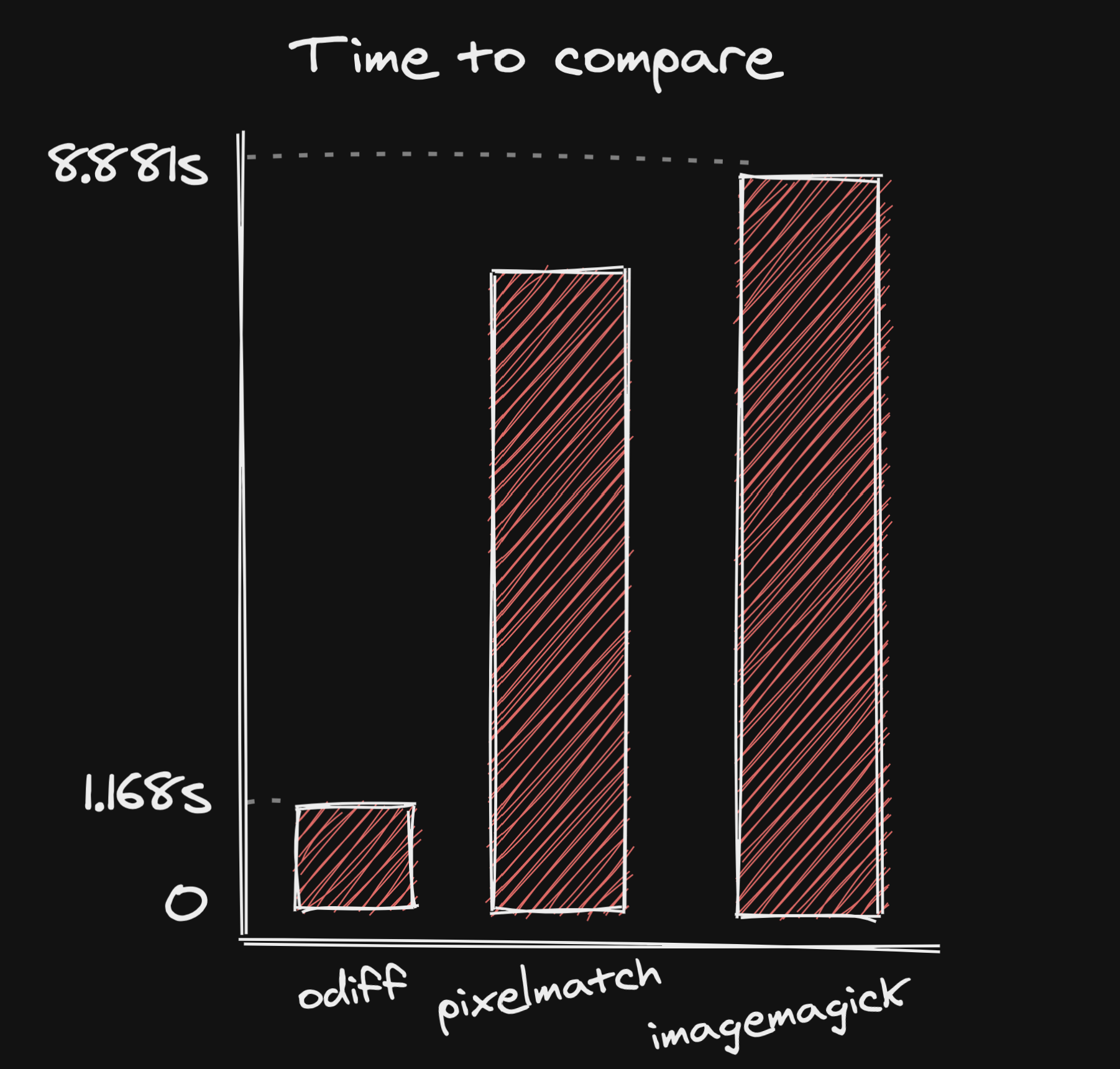ODiff is a blazing fast native image comparison tool. Check benchmarks for the results, but it compares the visual difference between 2 images in milliseconds. It was originally designed to handle the "big" images. Thanks to OCaml and its speedy and predictable compiler we can significantly speed up your CI pipeline.
| base | comparison | diff |
|---|---|---|
 |
 |
 |
 |
 |
 |
 |
 |
 |
- ✅ .png, .jpg, .jpeg, .bmp, .tiff, .xpm – Files supported.
- ✅ Cross-format comparison - Yes .jpg vs .png comparison without any problems.
- ✅ Supports comparison of images with different layouts.
- ✅ Anti-aliasing detection
- ✅ Using YIQ NTSC transmission algorithm to determine visual difference.
- ✅ No dependencies for
.pngcomparison. Only several system C dependencies for other formats, more info.
- ⏹ Ignoring regions
- ⏹ Reading image from memory buffer
- ⏹ Reading images from url
Run the simple comparison. Image paths can be one of supported formats, diff output can only be .png.
odiff <IMG1 path> <IMG2 path> <DIFF output path>
We also provides direct node.js binding for the odiff. Run the odiff from nodejs:
const { compare } = require("odiff-bin");
const { match, reason } = await compare(
"path/to/first/image.png",
"path/to/second/image.png",
"path/to/diff.png"
);Here is an api reference:
The best way to get up-to-date cli interface is just to type the
odiff --help
NodeJS Api is pretty tiny as well. Here is a typescript interface we have:
export type ODiffOptions = {
/** Color used to highlight different pixels in the output (in hex format e.g. #cd2cc9). */
diffColor: string;
/** Output full diff image. */
outputDiffMask: boolean;
/** Do not compare images and produce output if images layout is different. */
failOnLayoutDiff: boolean;
/** Color difference threshold (from 0 to 1). Less more precise. */
threshold: number;
/** If this is true, antialiased pixels are not counted to the diff of an image */
antialiasing: boolean;
};
declare function compare(
basePath: string,
comparePath: string,
diffPath: string,
options?: ODiffOptions
): Promise<
| { match: true }
| { match: false; reason: "layout-diff" }
| {
match: false;
reason: "pixel-diff";
/** Amount of different pixels */
diffCount: number;
/** Percentage of different pixels in the whole image */
diffPercentage: number;
}
>;
export { compare };Compare option will return { match: true } if images are identical. Otherwise return { match: false, reason: "*" } with a reason why images were different.
Make sure that diff output file will be created only if images have pixel difference we can see 👀
We provide prebuilt binaries for most of the used platforms, there are a few ways to install them:
The recommended and cross-platform way to install this lib is npm and node.js. Make sure that this package is compiled directly to the platform binary executable, so the npm package contains all binaries and post-install script will automatically link the right one for the current platform.
Important: package name is odiff-bin. But the binary itself is odiff
npm install odiff-bin
Then give it a try 👀
odiff --help
Make sure if you want to compare other than .png images it is required to install the proper C library for each format. For .jpg – libjpg, for .tiff –libtiff, for .xpm - libxpm.
.png images works out of the box.
⛔️ Doesn't work. Waiting for brew approve ⛔️
brew install odiff
apk add odiff
Download the binaries for your platform from release page.
Run the benchmarks by yourself. Instructions of how to run the benchmark is here
Performance matters. At least for sort of tasks like visual regression. For example, if you are running 25000 image snapshots per month you can save 20 hours of CI time per month by speeding up comparison time in just 3 seconds per snapshot.
3s * 25000 / 3600 = 20,83333 hours
Here is odiff performance comparison with other popular visual difference solutions. We are going to compare some real-world use cases.
Lets compare 2 screenshots of full-size https://cypress.io page:
| Command | Mean [s] | Min [s] | Max [s] | Relative |
|---|---|---|---|---|
pixelmatch www.cypress.io-1.png www.cypress.io.png www.cypress-diff.png |
7.712 ± 0.069 | 7.664 | 7.896 | 6.67 ± 0.03 |
ImageMagick compare www.cypress.io-1.png www.cypress.io.png -compose src diff-magick.png |
8.881 ± 0.121 | 8.692 | 9.066 | 7.65 ± 0.04 |
odiff www.cypress.io-1.png www.cypress.io.png www.cypress-diff.png |
1.168 ± 0.008 | 1.157 | 1.185 | 1.00 |
Wow. Odiff is mostly 6 times faster than imagemagick and pixelmatch. And this will be even clearer if image will become larger. Lets compare an 8k image to find a difference with another 8k image:
| Command | Mean [s] | Min [s] | Max [s] | Relative |
|---|---|---|---|---|
pixelmatch water-4k.png water-4k-2.png water-diff.png |
10.614 ± 0.162 | 10.398 | 10.910 | 5.50 ± 0.05 |
Imagemagick compare water-4k.png water-4k-2.png -compose src water-diff.png |
9.326 ± 0.436 | 8.819 | 10.394 | 5.24 ± 0.10 |
odiff water-4k.png water-4k-2.png water-diff.png |
1.951 ± 0.014 | 1.936 | 1.981 | 1.00 |
Yes it is significant improvement. And the produced difference will be the same for all 3 commands.
If you have recently updated, please read the changelog for details of what has changed.
The project is licensed under the terms of MIT license
This project was highly inspired by pixelmatch and imagemagick.
...one day a donation button will appear here. But for now you can follow author's twitter :)




